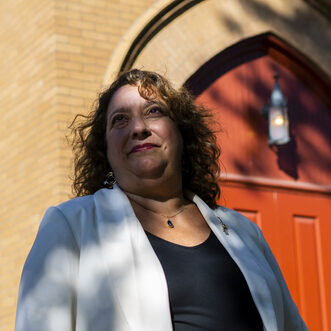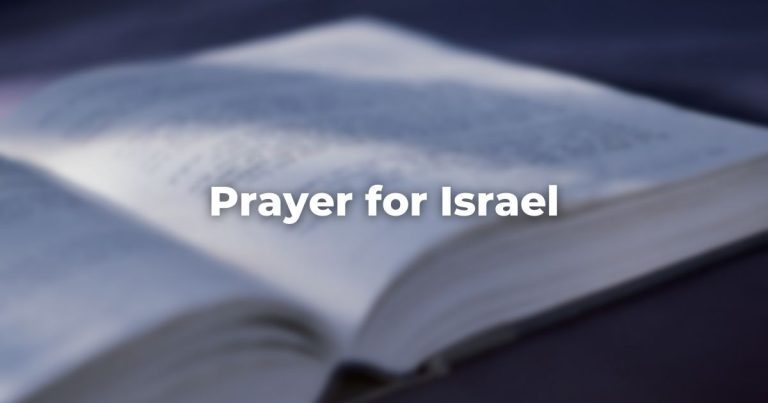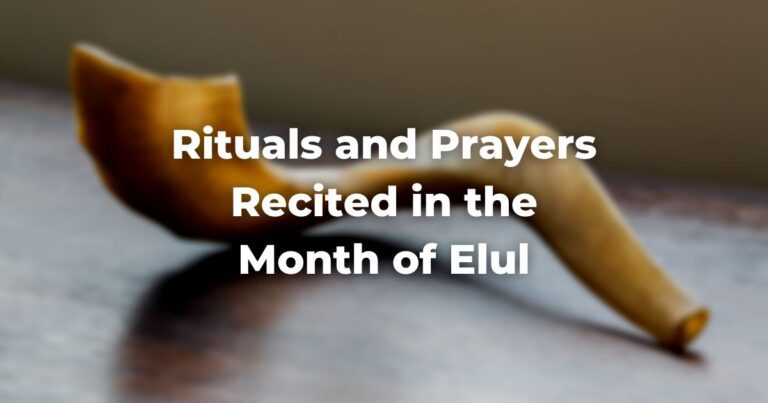Tahanun(also spelled Tachanun and meaning “Supplication”) is the name for a series of penitential prayers that follow the Amidah during the Morning and Afternoon Services.
The original intent of this portion of the service was to create space for personal prayer, but over the centuries these prayers too became formalized and they now appear as set prayers alongside the rest of the liturgy of the prayerbook.
There are two versions of Tahanun, a long version recited on Monday and Thursday mornings and a short version recited on the other weekday mornings and during the Afternoon Service. Tahanun is followed by the Half Kaddish.
It is customary for worshipers physically to demonstrate their penitential mood by resting their foreheads on the forearms when reciting the words vayomeir david (“and David said”), and then by remaining in that position until the end of the sixth psalm.
When resting the forehead on the arm, worshipers use their right arm when t’fillin (also spelled tefillin) are worn on the left arm, and the left arm during the Afternoon Service. Individuals wearing t’fillin on their right arms during the Morning Service rest their foreheads on their left arms in the morning as well.
This act of prostration, called n’filat appayim in Hebrew, is done while seated, but only in the presence of a Holy Ark with a TorahRefers to the first five books of the Hebrew Bible, the Tanakh, also called the Five Books of Moses, Pentateuch or the Hebrew equivalent, Humash. This is also called the Written Torah. The term may also refer to teachings that expound on Jewish tradition. Read more scroll in it.
Tahanun is not recited on days of great joy or, paradoxically, great sorrow.
We omit Tahanun, therefore, on the following weekdays:
- Rosh Hodesh
- the entire month of Nisan
- Pesah Sheini (14 Iyyar)
- Lag Ba-Omer
- all the days between Rosh Hodesh Sivan until the day after Shavuot
- Tishah Be’av
- the fifteenth of Av (Tu B’av)
- Erev Rosh Hashanah
- from Erev Yom Kippur until the second of Heshvan
- the entire week of Hanukkah
- Tu Bi-sh’vat
- the fourteenth and fifteenth of Adar (and, in leap years, of Adar Sheini as well)
- Yom Haatzma’ut
- Yom Yerushalayim
- Yom HaZikkaron
- Yom HaShoah
- (There are also congregations that omit Tahanun following Shavuot until the fourteenth day of Sivan.)
Tahanun is also omitted in a house of mourning during the shivah week; on a wedding day if either the bride or the groom is present during the service; on the day of a circumcision if the sandek, the mohel, or either parent is present; and during a service in the course of which a bar mitzvah, bat mitzvah, or b-mitzvah will be celebrated.
Some also omit Tahanun on certain secular holidays such as Thanksgiving and Independence Day in the United States.
Adapted with permission from The Observant Life.
Authors
-

The Observant Life: The Wisdom of Conservative Judaism for Contemporary Jews distills a century of thoughtful inquiry into the most profound of all Jewish questions: how to suffuse life with timeless values, how to remain loyal to the covenant that binds the Jewish people and the God of Israel, and how to embrace the law while retaining an abiding sense of fidelity to one’s own moral path in life. Written in a multiplicity of voices inspired by a common vision, the authors of The Observant Life explain what it means in the ultimate sense to live a Jewish life, and to live it honestly, morally, and purposefully. The work is a comprehensive guide to life in the 21st Century. Chapters on Jewish rituals including prayer, holiday, life cycle events and Jewish ethics such as citizenship, slander, taxes, wills, the courts, the work place and so much more.
View all posts -



Rabbi Dr. Karen G Reiss Medwed, works in higher education, as a Senior Assistant Dean for Faculty Affairs and Network Engagement. Dr. Reiss Medwed's scholarship includes understanding the growth of the field of digital education and instruction in higher education, K-12 education and faith-based education. Dr. Reiss Medwed was ordained by JTS in 1995, and earned her Ph.D. from New York University's Steinhardt School of Education in Curriculum, Teaching and Learning with a specialization in Jewish education in 2005. She was a Steinhardt Fellow for the four years of her doctoral studies. She went on to design and develop a Master of Education program in Faith-Based Education at the University of Pennsylvania's Graduate School of Education. Dr. Medwed has studied the development of innovative practices for digital learning and instruction and leadership in higher education.
View all posts






